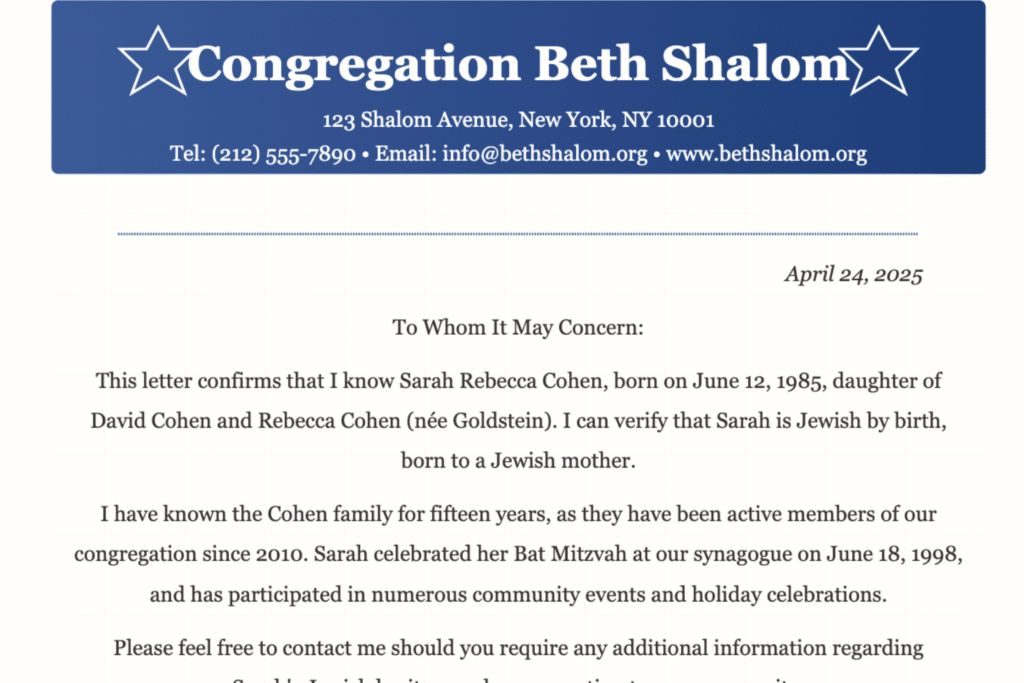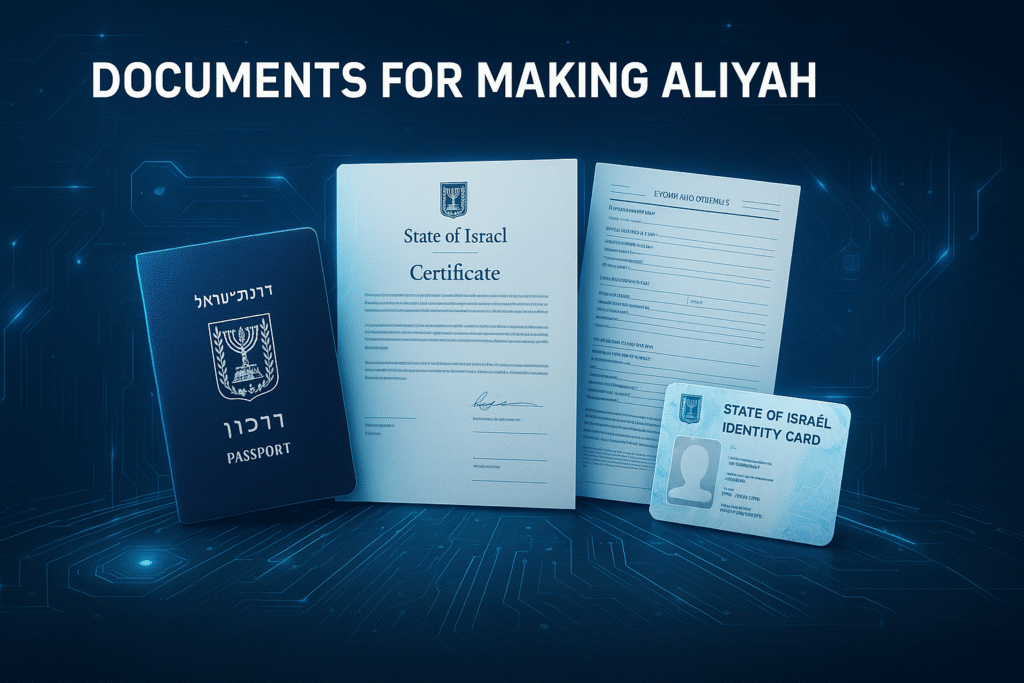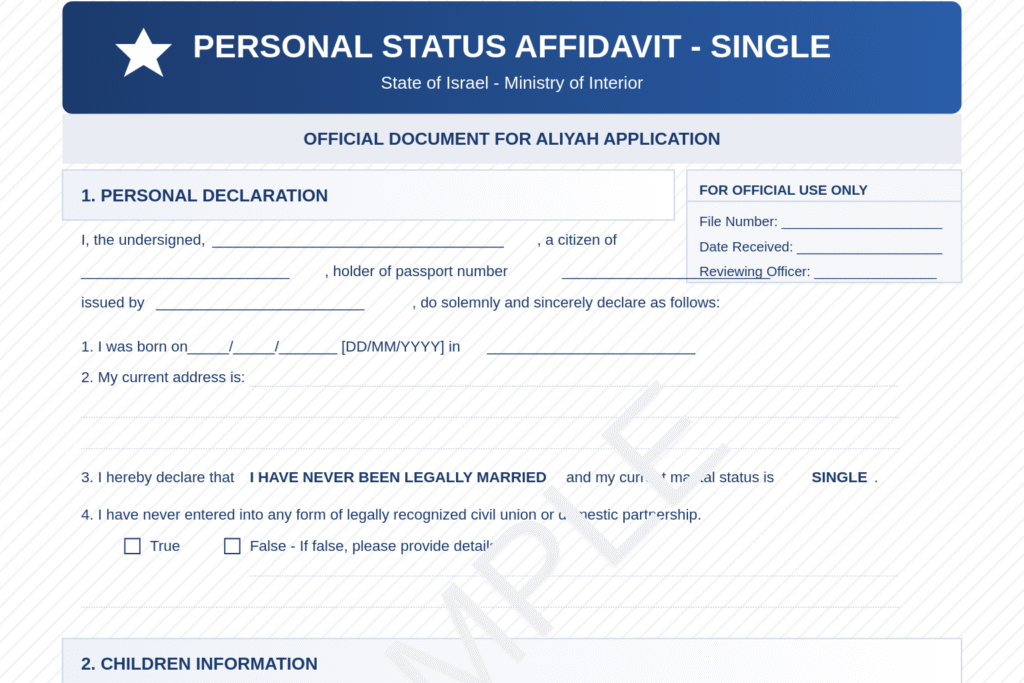Among the various documents required for making Aliyah to Israel, the “Rabbi Letter” or “Proof of Judaism Letter” stands as one of the most significant. This essential document serves as formal verification of your Jewish status and is a cornerstone of the Aliyah application process. Understanding its importance, requirements, and how to obtain it can help streamline your immigration journey to Israel.
What Is a Rabbi Letter?
A Rabbi Letter (sometimes called a “Proof of Judaism Letter”) is an official document from a recognized rabbi or Jewish community leader that confirms your Jewish status according to the criteria of the Law of Return. This letter verifies your eligibility for Aliyah by attesting to your Jewish heritage or conversion.
The letter must come from a rabbi who knows you personally or can verify your Jewish lineage through community records and knowledge. It serves as a primary piece of evidence for establishing your Jewish identity when documentation like birth certificates or ketubot (Jewish marriage contracts) might be incomplete or unavailable.
Why Is the Rabbi Letter So Important?
The Rabbi Letter holds particular significance in the Aliyah process for several reasons:
- Legal Verification: It provides official confirmation of your eligibility under Israel’s Law of Return.
- Addressing Documentation Gaps: For many applicants, especially those whose families were affected by the Holocaust, war, or migration, traditional documentation may be incomplete or lost. The Rabbi Letter can bridge these gaps.
- Cultural Connection: Beyond legal requirements, the letter establishes your connection to Jewish community life and traditions.
- Standardized Verification: It offers a consistent method of verification across diverse Jewish communities worldwide.
- Prevention of Fraud: The formality and specific requirements help Israeli authorities ensure that Aliyah rights are granted to eligible individuals.
Required Elements of a Valid Rabbi Letter
For a Rabbi Letter to be accepted by Israeli authorities, it must include specific elements and follow particular formatting guidelines:
Format Requirements:
- Must be written on official synagogue or rabbinic organization letterhead
- Should include the congregation’s name, address, and contact information
- Must be dated within a reasonable timeframe of your application
- Must contain the rabbi’s original ink signature (digital signatures are not accepted)
- The rabbi’s printed name and title must appear alongside the signature
- Must be written in either English or Hebrew only
Content Requirements:
- Your full legal name as it appears on your birth certificate and passport
- Your parents’ full legal names (and grandparents’ names when relevant to Jewish lineage)
- Clear statement of how you are Jewish (maternal lineage, paternal lineage, or conversion)
- For maternal lineage: explicit statement that you were born to a Jewish mother
- For paternal lineage: explicit statement that you were born to a Jewish father
- For converts: reference to your conversion process (note that additional documentation will be required)
- How the rabbi knows you or can verify your Jewish status
Different Requirements Based on Jewish Status
The specific content of the Rabbi Letter varies depending on the basis of your Jewish status:
For Those Jewish by Maternal Descent:
The letter must explicitly state that you were born to a Jewish mother and include both parents’ legal names. This follows the traditional halachic definition of Jewish identity passing through the maternal line.
For Those Jewish by Paternal Descent or Grandparent:
Under the expanded criteria of the Law of Return, those with Jewish fathers or grandparents may also qualify for Aliyah. The letter must clearly state the paternal Jewish connection and identify the specific Jewish father or grandparent.
For Converts to Judaism:
Converts require a more extensive documentation process, with the Rabbi Letter serving as one component. The letter should reference the conversion and may include details about the converting rabbinical court (Beit Din), but will typically be accompanied by actual conversion certificates and other supporting documents.
Who Can Write a Valid Rabbi Letter?
Not all rabbinical endorsements carry equal weight in the Aliyah process. The letter should come from:
- A rabbi from a recognized Jewish congregation or community
- A rabbi who has known you or your family personally
- A leader from an established Jewish organization with community standing
- A rabbi who can verify your status through community records
While letters from Orthodox rabbis typically face the fewest questions, letters from Conservative, Reform, and other denominational rabbis are also accepted for Aliyah purposes, though the Israeli rabbinate may have different standards for religious matters after arrival.
Common Challenges and Solutions
Many applicants encounter challenges when obtaining a Rabbi Letter:
Challenge: No Personal Connection to a Rabbi
Solution: Begin attending a local synagogue regularly, introduce yourself to the rabbi, and explain your Aliyah plans. Most rabbis will work with you over time to establish a relationship that allows them to write an informed letter.
Challenge: Relocated Away from Childhood Community
Solution: Contact the rabbi from your childhood synagogue, who may remember your family. Alternatively, have your parents’ current rabbi write a letter confirming their Jewish status, which can support your application.
Challenge: Secular Background with Minimal Community Connections
Solution: Connect with a Jewish community organization like a Jewish Community Center or Jewish Federation that might help verify your status through family records or introduce you to a rabbi who can help.
Challenge: Rabbi Unsure About Letter Format
Solution: Share the official guidelines from the Jewish Agency or Nefesh B’Nefesh with your rabbi to ensure their letter meets all requirements.
Tips for Obtaining an Effective Rabbi Letter
- Start Early: Begin the relationship-building process with a local rabbi well before your planned Aliyah date.
- Be Transparent: Explain to the rabbi why you’re seeking the letter and your Aliyah timeline.
- Provide Supporting Documents: Share any Jewish documentation you already have with the rabbi to help them verify your status.
- Review Before Submission: Politely ask to review the letter before it’s finalized to ensure all required elements are included.
- Request Multiple Originals: Having several original copies can be helpful if needed for different aspects of the application process.
- Follow Up: If the Jewish Agency requests clarification or additional information, work with your rabbi promptly to provide it.
Beyond the Basic Requirements: Strengthening Your Letter
While meeting the basic requirements is essential, a strong Rabbi Letter often goes beyond the minimum. Consider these elements that can strengthen your letter:
- References to your participation in Jewish life and community events
- Mention of Jewish lifecycle events (Bar/Bat Mitzvah, Jewish wedding, etc.)
- Information about your Jewish education or involvement
- Observations about your commitment to Jewish values and practices
- Personal touch that reflects the rabbi’s actual knowledge of you
Additional Documentation You May Need
The Israeli authorities may request supplementary documentation to support your Rabbi Letter, including:
- Birth certificates showing your mother’s Jewish maiden name
- Parents’ ketubah (Jewish marriage contract)
- Grandparents’ Jewish documentation (for applications based on Jewish grandparentage)
- Jewish education records
- Synagogue membership records
- Bar/Bat Mitzvah certificates
Conclusion: The Rabbi Letter as Part of Your Jewish Journey
The Rabbi Letter represents more than just bureaucratic paperwork—it’s a formal acknowledgment of your place within the Jewish people. Many find the process of obtaining this letter meaningful, as it often involves reflection on family history and personal Jewish identity.
While the requirements may seem stringent, they serve an important purpose in preserving the integrity of Israel’s Law of Return. By understanding the process and preparing appropriately, you can ensure that your Rabbi Letter effectively supports your Aliyah application and helps smooth your journey to becoming an Israeli citizen.
Remember that the Jewish Agency, Nefesh B’Nefesh, and other Aliyah support organizations can provide guidance if you encounter difficulties obtaining an appropriate Rabbi Letter. With proper preparation and understanding, this important document can be secured with minimal stress, allowing you to focus on the exciting transition to your new life in Israel.


